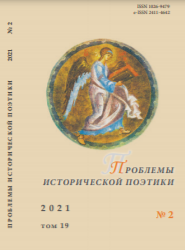Поэтология Ольги Берггольц: рефлексия и авторская стратегия
The Poetological Statements of Olga Bergholz: Reflection and Author’s Strategy
Author(s): Natalya А. ProzorovaSubject(s): Music, Studies of Literature, Recent History (1900 till today), Theory of Literature
Published by: Петрозаводский государственный университет
Keywords: Bergholz; poetology; imaginative thinking; musical imagery; mission of the poet; autobiography; self-expression; creativity;
Summary/Abstract: The poetology of O. F. Bergholz has not yet been sufficiently studied. The article is devoted to the poetological statements made by the Leningrad poetess in her literary texts and in the recently published diaries. The relevance of the work lies in the identification of the key images and motives related to the theme of poet and poetry, the author’s creative aims and ways of artistic exploration of life. Bergholz’s interpretation of creativity is associated with musical imagery. The theme of the poet and poetry is embodied in the ‘sounding’ and ‘ringing’ images of pipes, flutes, strings and bells. For her, a song is a similar to a child that is difficult to carry to term, one with an independent hypostasis, it can wake up or be silent, live or die. Bergholz feels that it is not the poet who has command over the song, but the song that controls the poet. She experiences the creative act as a sacred act, and at the same time as hard work on choosing the “very best word.” Bergholz had reflected on a poet’s mission since an early age and realized her destiny as a projection of the healer-poet, while developing the themes of the educator-poet (“sower”) and the bell-poet (the rebel poet), which are traditional in Russian literature. Bergholz saw the specificity of her own poetics in the simplicity of language and style; in her aesthetics, simple meant great. The autobiographic nature of her writing, marked in the title complex of many of her works, was her fundamental principle. She saw the key to reader recognition in the documentary (reliable) component of the poetic text. Bergholz considered self-expression the only way of artistic cognition of life. She juxtaposed the self-expression intention to the principle of mirroring reality, which was cultivated by socialist realism, emphasizing that these two approaches were mutually exclusive for her. The recurrent motive of Bergholz’s autobiographical discourse is the reflection on the possibility/impossibility of verbally embodying the most torturous creative intention. The poet felt the lack of realization (incompleteness) of her poetry and creative path in general.
Journal: Проблемы исторической поэтики
- Issue Year: 19/2021
- Issue No: 2
- Page Range: 353-372
- Page Count: 20
- Language: Russian

